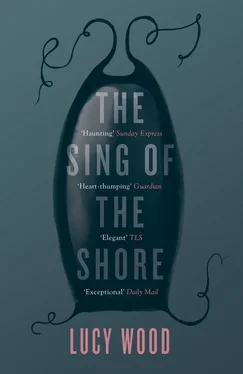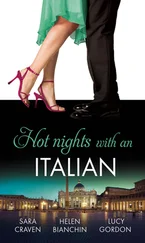It got colder the lower he went into the valley. He could hear the sea somewhere in the distance. Water ran down the road and splashed up his legs. It looked orange, like it was leaking through rusty iron.
The mist thickened into drizzle and he shivered. He crouched down and tucked the baby in tighter. She was making cooing sounds at the gorse, trying to reach out and grab it. He showed her the prickles but she grabbed at it anyway. There was gorse everywhere, like lamps in the hedges. It gave out a sweet, heavy smell.
The drizzle came in waves, sweeping across the tops of the trees, and hanging there like curtains. The road narrowed again. Something moved in the dead leaves under a tree. He walked slowly, checking every bend before carrying on. He came to the bottom of the road and it forked: one way turned into a track that followed a stream, the other seemed to bend inland. He took that one and kept going. There were no road signs, just hedges and fields and the valley below him: the trees huddled like a herd of animals escaping the weather.
‘Sa?’ the baby asked.
He stroked her damp cheek with his finger.
There was the sound of a motor in the distance, coming closer, and he walked forward to find a wider bit of road. Whatever it was, it was moving fast, the engine revving. He smelled the petrol before he saw it. There was no wider bit of road. He walked back quickly, away from the bend. He crammed the pram in sideways against the hedge, mounting the wheels up on the bank and pressing it in as far as it would go.
It was a dark blue van. It came careening round the corner of the lane and revved past him before he could see who was in it. The wing mirror brushed against him as it went.
Jay jumped out and shook his fist at the back of the van. ‘You arsehole,’ he shouted. ‘You irresponsible son-of-a-bitch arsehole.’
He got the pram out of the hedge. The baby had a handful of dried leaves in each fist and was chewing on a stick. He took the stick out of her mouth and crouched down to check she was OK.
‘Don’t ever repeat what I just said,’ he told her.
The baby looked at him, then back down at the leaves she was holding.
He stood in the middle of the road. No one else went past. He saw no one except a farmer, small and faint, walking through a field in the distance. The baby went to sleep. Her hand slackened and the leaves fell out. He turned and started walking back. Soon the dishes rose up in front of him. One of them was pointing down at the valley. It stayed like that all night.

His wife hummed low, monotonous tunes in the shower. She used to sing pop songs, ballads, those deep, soulful ones where she used the showerhead as a microphone, but now she just hummed the same thing over and over, quietly and without stopping, like static on an old radio.
While she was in the shower, music started up behind the wall. It was slow but with a heavy beat that thrummed through the floor. It was coming from somewhere near the kitchen, then it faded and seemed to move into the living room, then down the hall, as if it was in the pipes or the wires.
Jay’s heart gave a strange lurch. He banged on the wall. ‘Stop it,’ he said. He banged again. ‘Stop it.’
The music didn’t stop. He followed it through the house. It was louder near the bathroom. When he went in, it sounded like it was in the room, low and slow and echoing off the tiles.
He could see Lorna through the steam. She was washing her hair and there was soap and bubbles all over her head. She was humming and her eyes were closed.
There was a thump near the door, and then the sound of breathing only a few inches from where Jay was standing. A cold draught came under the door. Any moment now Lorna would rinse off the soap and take her hands away from her ears and then she would hear.
The breathing got louder. The music surged. Lorna ducked her head under the water and shampoo ran down her neck and onto her shoulders.
He stood in the middle of the room, clenching his hands. His nails dug into his palms. He could tell, even behind the music, the particular way the body would be pressing against the wall.
Stop, he said silently. Stop it.
Lorna shook her wet hair and turned off the shower.
The music stopped.
She opened her eyes and when she saw Jay she let out a faint cry and put her hand on her chest, looking at him for a moment as if she didn’t recognise him at all.

The phone rang from behind the wall. It rang and then it cut out, then it rang again. Still no one answered it.

It was lunchtime and Jay was cleaning up. The baby had woken him every few hours in the night and he kept knocking things onto the floor – cups, bits of food. The baby would lean down out of her chair and try to help him pick them up, then almost topple out, so he would straighten her, and then she would do it again, clapping her sticky hands.
Soon Lorna would be home and he would start cooking something for dinner.
He ran the sink full of hot water. It was cold in the house, his hands were cold and he was looking forward to dipping them in.
An engine revved suddenly and he looked up just in time to see the van speed away past the window. The tyres left a burning smell on the air.
He picked up a plate and put it in the sink. He washed it and stacked it on the draining board. Bubbles ran down and pooled in the grooves. He started on another plate.
A door slammed and someone shouted from behind the wall.
He fumbled with the plate, dropped it in the sink, and hot water splashed over his feet.
There was a bang, then voices. ‘Why did you?’ someone said. ‘Why did you do it?’ There was another bang, and a long silence.
Jay picked up the plate. It had cracked down the middle. He stroked the baby’s cheeks. She seemed fine; she was pushing a bit of cracker around her tray, jabbing at it until it was wet and crumbly.
‘Ham nu for,’ she said, pointing to it.
‘It’s OK,’ Jay told her. ‘It’s OK.’
He dried his hands, sat down, then got up and opened the door. He went outside and paced around the front of the houses. There were no cars; the house next door looked empty. In another house, further up the row, washing billowed on the line; trousers and shirts straining against their pegs as if they were trying to get away.
Something moved behind next door’s window. Jay ran to the door and raised his hand to knock, his hand was in a fist, it was almost on the door, then he stopped and brought his hand down. He stood on the step for a long time.

The baby watched him. ‘Wayha do int?’ she said one morning. She looked at him carefully, as if she was waiting for an answer.

His wife got home late and they sat, almost asleep, on the sofa in front of the TV. Jay flicked through the channels – there were old programmes on that they used to watch, repeats that seemed half-familiar, the jokes coming in slightly different places than he remembered.
Читать дальше













